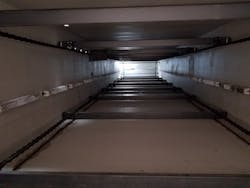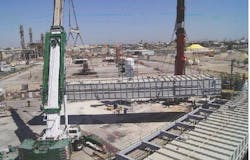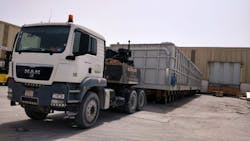Reaching Full Potential
About the author:
Lee Averett is lead project manager for WesTech Engineering. Averett can be reached at [email protected].
With aging water infrastructure, one often faces dwindling efficiency, insufficient capacity, and lost abilty to meet new regulations. A decades old refinery in Bahrain, part of the Persian Gulf region, faced these exact challenges.
An expansion was initiated, motivated by an urgent need to meet government regulations and to increase capacity. An important aspect of the project, and key to protecting the environment, was to upgrade and improve wastewater handling.
A Decision to Rebuild the BAPCO Refinery
Bahrain is a small island nation in the Middle East, with just one petroleum refinery – Bahrain Petroleum Company (BAPCO). BAPCO began refining oil in 1932 under private ownership, although the facility is now majority owned by the Government of Bahrain. The refinery is an important driver of the nation’s pioneering industrial force and has helped shape the modern Kingdom of Bahrain. It is the largest sector of the country’s economy.
Most of the equipment in use has been in place since the early 1970s when the last expansion and upgrade took place. Today, BAPCO produces 265,000 barrels of oil per day but the hope was to complete an expansion that would allow up to 380,000 barrels per day to be processed, a 42% increase in production capacity.
Along with increased capacity, BAPCO hoped to be one of the most environmentally-compliant oil refineries in the region. As part of the Kingdom of Bahrain’s comprehensive Bahrain Economic Vision 2030, there is a large role for infrastructure and a priority on sustainability. The implementation of the objectives and indicators of sustainable development in the Kingdom is the first of its kind in the region and shows the commitment of the Kingdom of Bahrain to the United Nations agenda for sustainable development. As part of the sustainable development target, the government of Bahrain has specific effluent requirements that need to be reached through the refinery’s upgrade.
The conditions and design requirements for the API separators at the Bahrain refinery are similar to those in other parts of the world, including the U.S. Some of the improvements at the plant follow similar design and performance requirements to the U.S. refineries such as how wovers for the API separators ensure volatile organic compounds (VOCs) are not released to the atmosphere. Emission standards ensure the same.
Also similar is how the treated effluent follows Bahrain Government regulatory standards, similar to how U.S. refineries follow EPA standards. The effluent cannot have more than 80 mg/L of free oil and grease in the water.
Wastewater Treatment & Refinery Expansion
The government of Bahrain hired a consortium of companies to work on the overall refinery expansion. As part of the project, the consortium hired JGC (Japan Gasoline Corp.) to completely revamp the API separators. JGC ran the project from its office in the Kingdom of Saudi Arabia, and hired WesTech Engineering (Salt Lake City, Utah) as the equipment supplier. The installation included three API separators, each almost 32 meters long, and three AODD sludge pump skids.
API separators, which are designed to separate oil from water, are designed according to API 421 which defines size — length, width, and depth — based on temperature, specific gravity, and viscosity among other process conditions.
Frequently, API separators serve the dual purpose of removing solids from the process stream. Removal of solids is accomplished by means of a chain and flight mechanism inside of the chamber which pushes the suspended solids to a sludge collection hopper. WesTech also provided three AODD pump skids for this installation that remove the sludge from the sludge hoppers in the API separators, and pump it to a sludge collection facility.
Prior to the upgrade, the separators were essentially open pits where the oil floated to the top and eventually floated to a collection chamber. The refinery wanted to upgrade the emission control and odor control of the separators by including covers on the new separators. This helped to meet environmental regulations and improve efficiency. The new API separators also allow the refinery to capture more FOG by use of the internal chain and flight mechanism and the slotted pipe skimmer. This way they can recycle this FOG in the refining process, helping to increase efficiencies and reduce waste.
Special challenges
Chloride-Rich Influent Water From the Persian Gulf
BAPCO is pulling its process water out of the Persian Gulf. Seawater is very high in chlorides, which is corrosive to most materials, requiring special high chrome stainless-steels in the manufacturing of the API separators. A carbon steel that is NACE MR0175 compliant was used to handle the super high chlorides.
Using the NACE MR0175 compliant carbon steel meant that additional steps with welding and fabrication were needed to accommodate for the material. All welds on the tanks had to be pre-heated to ensure a Brinnell hardness of less than 200 when tested.
The chloride-rich water also meant that high chrome stainless steels, such as 2205 duplex stainless steel, and 2507 super duplex stainless steel, had to be used for the internal components of the API separator. Also, cathodic protection was added inside the tank. The high chrome stainless steels and cathodic protection will protect the API separators from premature corrosion, due to the chloride rich influent water, and ensure a long life.
Oil & Water Separator Design for High Nitrogen Blanket Pressure
This project had an unusual challenge for the design of the API oil and water separators. It required a nitrogen blanket system to be pumped into the tanks at 0.3 psi(g). The nitrogen blanket protects against the VOCs and keeps the vapor space safe from explosion or fire.
Normally, with a cover, the tank is designed to an internal pressure of 0.36 psi(g). However, these tanks were designed to 1 psi(g) pressure – the large surface area creates a significant pressure that had to be accounted for in the calculations for tank design.
Local Fabricators Relationships & Remote Construction Management
It is hard to manage vendors when you are on the other side of the world and a pandemic is going on. With boots on the ground, one can more easily source local fabricators. Building relationships with knowledgeable Bahrain vendors became a key turning point in the project.
For large jobs like this, a full-time presence is needed to meet and communicate with people in country. Working with them face to face allows more timely information transfer and quicker responses that are often needed to move the project forward in a reasonable timeline. On-site personnel are also very good at building relationships with the crew at the job site, as well as the vendors; this increases job efficiency and decreases costs.
After experiencing some of the challenges of designing electrical equipment to be produced in the U.S., and after months of frustration, WesTech began working with a local fabricator – Prudent Solutions in Bahrain. The team there was highly qualified and could quickly interpret the specialized terminology for electrical requirements at the BAPCO refinery site. WesTech worked with a local PLC fabricator to build the PLC in Bahrain. This reduced the lead times required for FAT testing, shipping, and installation at site.
At BAPCO, the enormous tanks were designed to be elevated 3 meters off the ground. An in-country person was needed to work closely with the vendor supplying the support structure for the API separators, to confirm that the fabrication of the tanks and the support structure fit together seamlessly.
Equipment to Withstand Extreme Heat & Sun
The three AODD Sludge pump skids were built in the U.S. and shipped to Bahrain. The pumps needed to be made of Kynar material. This material withstands strong sunlight better than other materials and is very compatible with the chloride rich water.
The piping materials for the AODD Sludge pump skids were glass reinforced epoxy piping (GRE) to be compatible with the chloride rich water. Using these specialized materials required extra time in creating the equipment design. More time was needed to source the material as it was purchased from the fabricator in the United Arab Emirates and shipped to the U.S. for assembly.
Language & Culture Barriers
Time difference, weekends that begin on Thursday night, language barriers, and terminology misunderstandings presented additional difficulties.
Working with a project so far away, in a country with a very different culture, required flexibility and patience. As a predominantly Muslim country, weekends were Friday and Saturday, and so work weeks began and ended on different days creating communication delays. Most people spoke English as a second language so basic communication was possible. However, specific terminology was not always the same between languages. It required more extensive explanation and double checking of designs.
One additional challenge faced in Bahrain was vendor payment terms. While they received a purchase order, no work would begin until payment was made in full, not to mention U.S. credit cards were not accepted.
Results
It became clear during this project that maintaining a close partnership with the customer as well as the vendors was vital. Once the listed challenges and delays were mitigated, the project was efficiently moved to completion.
The WesTech portion of the BAPCO project was completed in 1.5 years. The upgrade will help the refinery meet regional effluent standards and increase capacity by 42%.
The effluent requirements for TSS were less than 100 mg/L; after performance testing, the actual effluent was on average less than 50 mg/L. The effluent requirements for FOG was less than 80 mg/L, andafter performance testing, the actual effluent was on average less than 30 mg/L.
An important result of this project was the relationships that WesTech built with industry people in Bahrain. By working closely with them, learning from them, and successfully completing the project, WesTech hopes to be the equipment supplier of choice as the country’s focus on sustainability requires other wastewater treatment initiatives.


